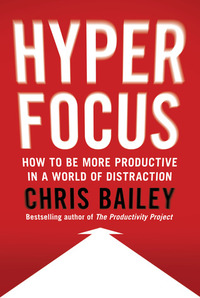Take a photo of a barcode or cover
informative
medium-paced
Practical and interesting.
I liked more the scatterfocus part
I liked more the scatterfocus part
informative
reflective
medium-paced
I came with low expectations and those were met.
A few tips (like caffeine and alcohol consumption) might be true on a pharmacological level regarding brain chemistry - but the other consequences (especially harmful ones!) of them on the body were not elaborated on.
It is generally based on the idea of willpower being a limitless resource.
Also, it uses the term Hyperfocus as something you can willfully apply to anything that needs doing.
A few tips (like caffeine and alcohol consumption) might be true on a pharmacological level regarding brain chemistry - but the other consequences (especially harmful ones!) of them on the body were not elaborated on.
It is generally based on the idea of willpower being a limitless resource.
Also, it uses the term Hyperfocus as something you can willfully apply to anything that needs doing.
informative
inspiring
fast-paced
informative
reflective
fast-paced
informative
medium-paced
challenging
informative
inspiring
informative
inspiring
reflective
fast-paced
Hyperfocus van Chris Bailey is een non-fictieboek over aandacht, concentratie en productiviteit in een wereld vol afleiding. Het centrale idee is dat we bewuster kunnen omgaan met onze focus en zo niet alleen efficiënter, maar ook creatiever en rustiger kunnen leven.
Ik vond het boek interessante concepten bevatten, zoals het verschil tussen hyperfocus (intens gefocust werken) en scatterfocus (dagdromen voor creativiteit). Veel van de inzichten zijn praktisch toepasbaar en zetten je aan het denken over hoe je je eigen aandacht verdeelt, zeker relevant in een tijd waarin afleiding altijd binnen handbereik is.
Tegelijk voelde het boek soms wat herhalend, en miste ik af en toe diepgang of echt nieuwe inzichten. Daarom geef ik het 3 sterren: een toegankelijke en nuttige read met ideeën die je kunt meenemen in je dagelijks leven, maar niet baanbrekend.
Ik vond het boek interessante concepten bevatten, zoals het verschil tussen hyperfocus (intens gefocust werken) en scatterfocus (dagdromen voor creativiteit). Veel van de inzichten zijn praktisch toepasbaar en zetten je aan het denken over hoe je je eigen aandacht verdeelt, zeker relevant in een tijd waarin afleiding altijd binnen handbereik is.
Tegelijk voelde het boek soms wat herhalend, en miste ik af en toe diepgang of echt nieuwe inzichten. Daarom geef ik het 3 sterren: een toegankelijke en nuttige read met ideeën die je kunt meenemen in je dagelijks leven, maar niet baanbrekend.


